Holmes Institute HI6027 Business & Corporate Law Final Assessment
VerifiedAdded on 2023/06/14
|7
|2642
|380
Homework Assignment
AI Summary
This document presents a student's solution to the HI6027 Business and Corporate Law Final Assessment for Trimester 3, 2021. The assessment covers key concepts, including contract law, consideration, the parol evidence rule, business structures (sole proprietorship, partnership, franchising), directors' statutory obligations under the Corporations Act 2001 (Cth), and insider trading regulations. The student answers six questions, providing explanations, examples, and legal references. Topics include the formation of contracts, the sufficiency and adequacy of consideration, exceptions to the parol evidence rule, advantages and disadvantages of different business structures, directors' duties regarding conflicts of interest, and the legal consequences of insider trading based on the Corporations Act 2001.
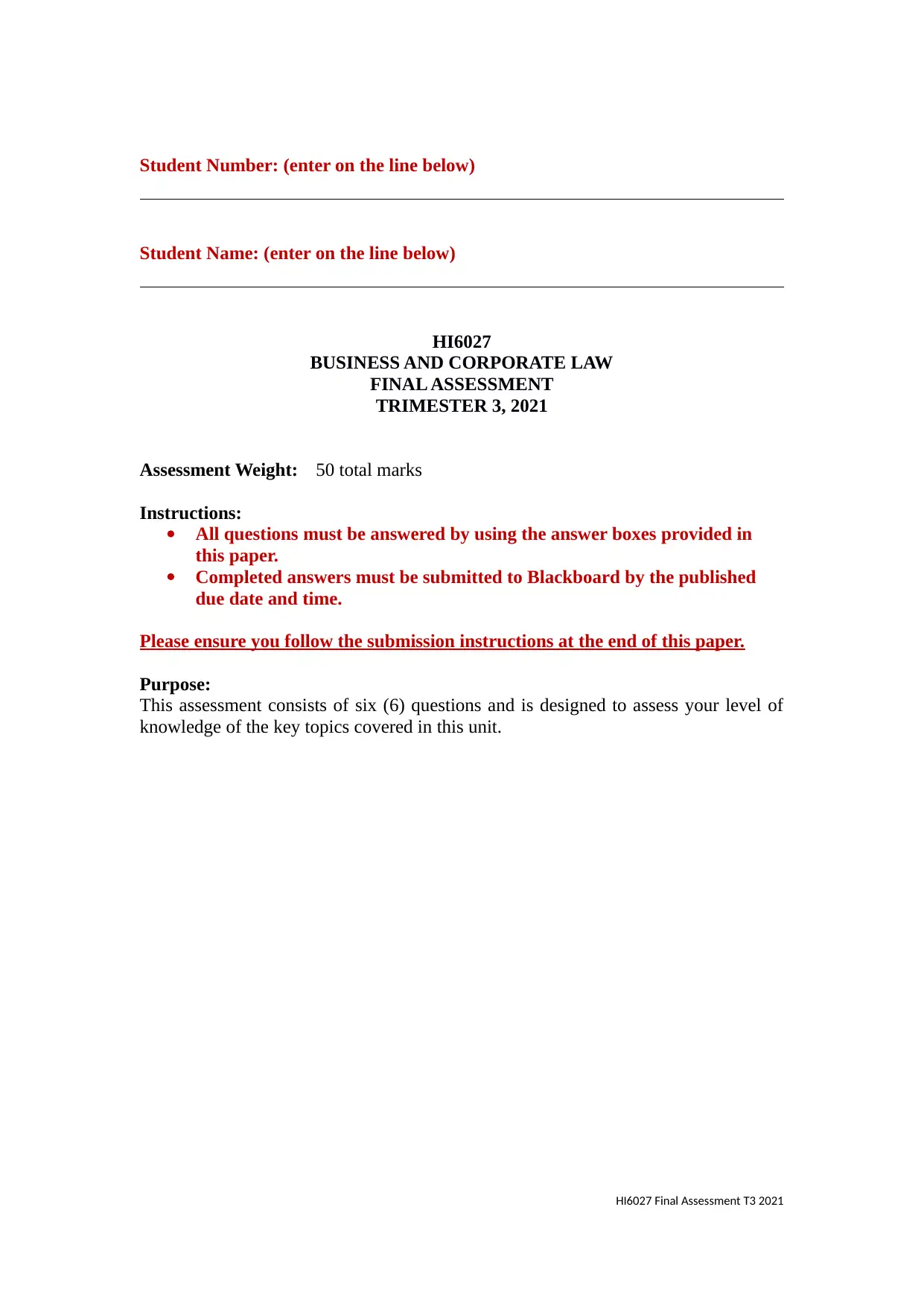
Student Number: (enter on the line below)
Student Name: (enter on the line below)
HI6027
BUSINESS AND CORPORATE LAW
FINAL ASSESSMENT
TRIMESTER 3, 2021
Assessment Weight: 50 total marks
Instructions:
All questions must be answered by using the answer boxes provided in
this paper.
Completed answers must be submitted to Blackboard by the published
due date and time.
Please ensure you follow the submission instructions at the end of this paper.
Purpose:
This assessment consists of six (6) questions and is designed to assess your level of
knowledge of the key topics covered in this unit.
HI6027 Final Assessment T3 2021
Student Name: (enter on the line below)
HI6027
BUSINESS AND CORPORATE LAW
FINAL ASSESSMENT
TRIMESTER 3, 2021
Assessment Weight: 50 total marks
Instructions:
All questions must be answered by using the answer boxes provided in
this paper.
Completed answers must be submitted to Blackboard by the published
due date and time.
Please ensure you follow the submission instructions at the end of this paper.
Purpose:
This assessment consists of six (6) questions and is designed to assess your level of
knowledge of the key topics covered in this unit.
HI6027 Final Assessment T3 2021
Paraphrase This Document
Need a fresh take? Get an instant paraphrase of this document with our AI Paraphraser
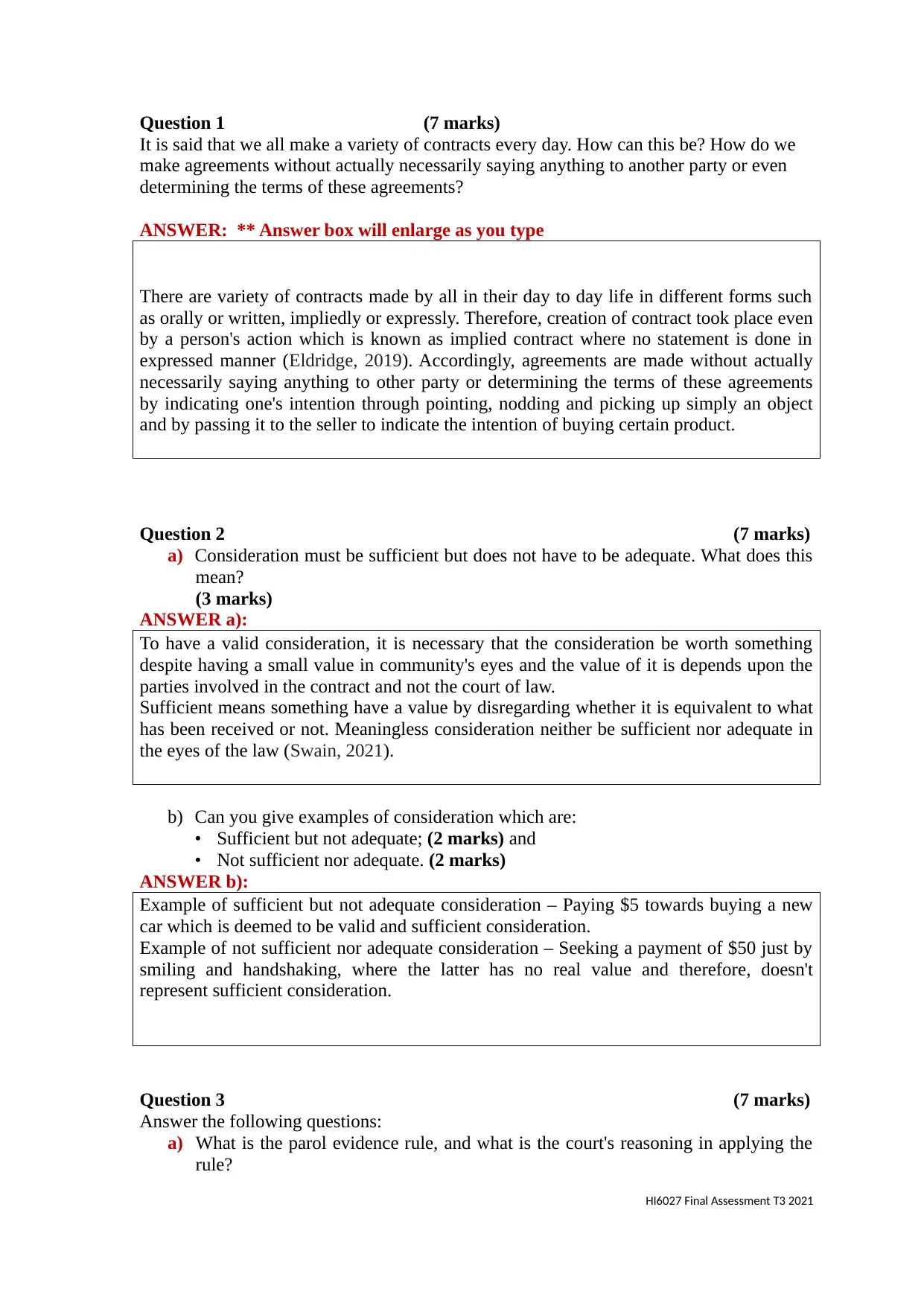
Question 1 (7 marks)
It is said that we all make a variety of contracts every day. How can this be? How do we
make agreements without actually necessarily saying anything to another party or even
determining the terms of these agreements?
ANSWER: ** Answer box will enlarge as you type
There are variety of contracts made by all in their day to day life in different forms such
as orally or written, impliedly or expressly. Therefore, creation of contract took place even
by a person's action which is known as implied contract where no statement is done in
expressed manner (Eldridge, 2019). Accordingly, agreements are made without actually
necessarily saying anything to other party or determining the terms of these agreements
by indicating one's intention through pointing, nodding and picking up simply an object
and by passing it to the seller to indicate the intention of buying certain product.
Question 2 (7 marks)
a) Consideration must be sufficient but does not have to be adequate. What does this
mean?
(3 marks)
ANSWER a):
To have a valid consideration, it is necessary that the consideration be worth something
despite having a small value in community's eyes and the value of it is depends upon the
parties involved in the contract and not the court of law.
Sufficient means something have a value by disregarding whether it is equivalent to what
has been received or not. Meaningless consideration neither be sufficient nor adequate in
the eyes of the law (Swain, 2021).
b) Can you give examples of consideration which are:
• Sufficient but not adequate; (2 marks) and
• Not sufficient nor adequate. (2 marks)
ANSWER b):
Example of sufficient but not adequate consideration – Paying $5 towards buying a new
car which is deemed to be valid and sufficient consideration.
Example of not sufficient nor adequate consideration – Seeking a payment of $50 just by
smiling and handshaking, where the latter has no real value and therefore, doesn't
represent sufficient consideration.
Question 3 (7 marks)
Answer the following questions:
a) What is the parol evidence rule, and what is the court's reasoning in applying the
rule?
HI6027 Final Assessment T3 2021
It is said that we all make a variety of contracts every day. How can this be? How do we
make agreements without actually necessarily saying anything to another party or even
determining the terms of these agreements?
ANSWER: ** Answer box will enlarge as you type
There are variety of contracts made by all in their day to day life in different forms such
as orally or written, impliedly or expressly. Therefore, creation of contract took place even
by a person's action which is known as implied contract where no statement is done in
expressed manner (Eldridge, 2019). Accordingly, agreements are made without actually
necessarily saying anything to other party or determining the terms of these agreements
by indicating one's intention through pointing, nodding and picking up simply an object
and by passing it to the seller to indicate the intention of buying certain product.
Question 2 (7 marks)
a) Consideration must be sufficient but does not have to be adequate. What does this
mean?
(3 marks)
ANSWER a):
To have a valid consideration, it is necessary that the consideration be worth something
despite having a small value in community's eyes and the value of it is depends upon the
parties involved in the contract and not the court of law.
Sufficient means something have a value by disregarding whether it is equivalent to what
has been received or not. Meaningless consideration neither be sufficient nor adequate in
the eyes of the law (Swain, 2021).
b) Can you give examples of consideration which are:
• Sufficient but not adequate; (2 marks) and
• Not sufficient nor adequate. (2 marks)
ANSWER b):
Example of sufficient but not adequate consideration – Paying $5 towards buying a new
car which is deemed to be valid and sufficient consideration.
Example of not sufficient nor adequate consideration – Seeking a payment of $50 just by
smiling and handshaking, where the latter has no real value and therefore, doesn't
represent sufficient consideration.
Question 3 (7 marks)
Answer the following questions:
a) What is the parol evidence rule, and what is the court's reasoning in applying the
rule?
HI6027 Final Assessment T3 2021
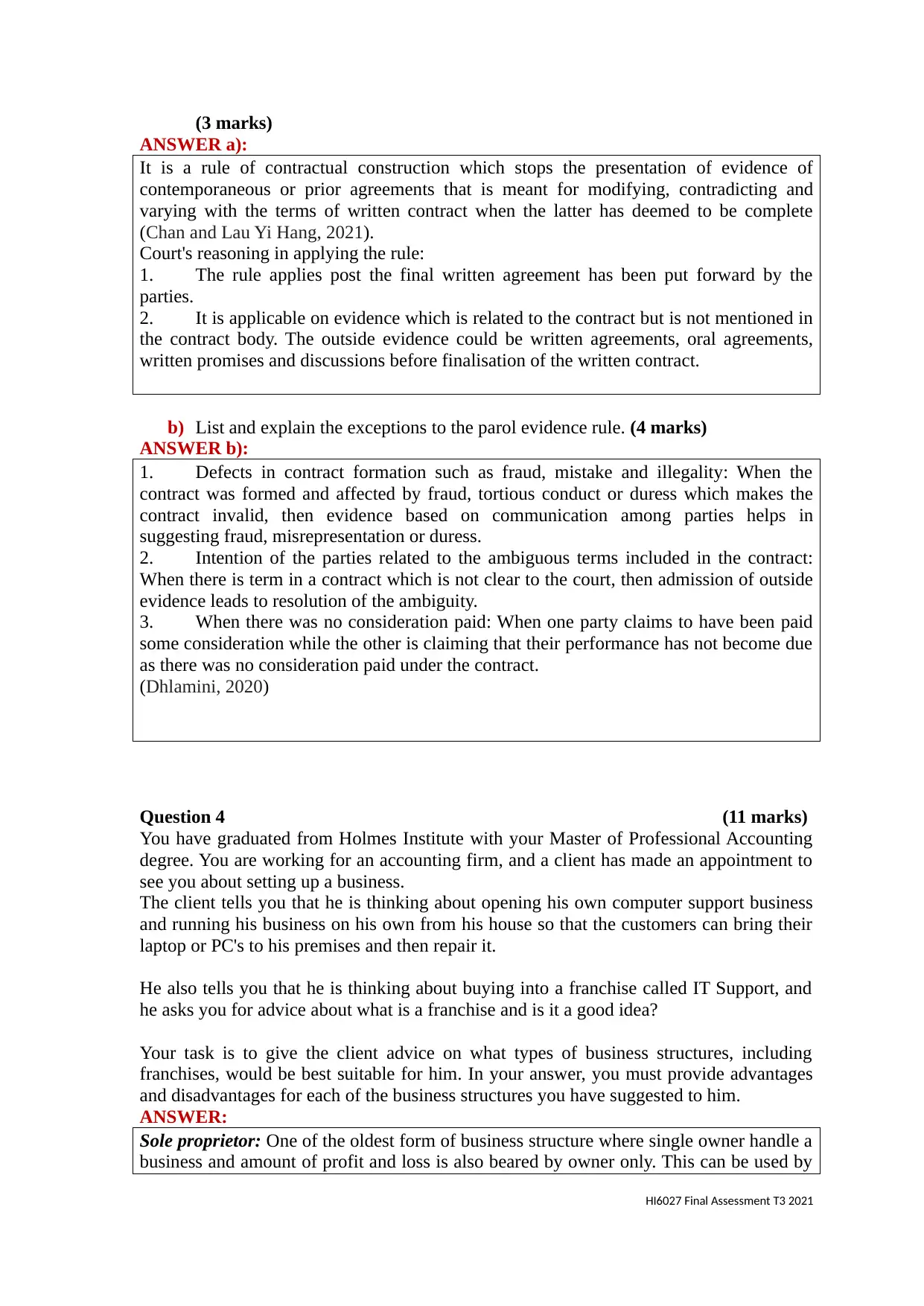
(3 marks)
ANSWER a):
It is a rule of contractual construction which stops the presentation of evidence of
contemporaneous or prior agreements that is meant for modifying, contradicting and
varying with the terms of written contract when the latter has deemed to be complete
(Chan and Lau Yi Hang, 2021).
Court's reasoning in applying the rule:
1. The rule applies post the final written agreement has been put forward by the
parties.
2. It is applicable on evidence which is related to the contract but is not mentioned in
the contract body. The outside evidence could be written agreements, oral agreements,
written promises and discussions before finalisation of the written contract.
b) List and explain the exceptions to the parol evidence rule. (4 marks)
ANSWER b):
1. Defects in contract formation such as fraud, mistake and illegality: When the
contract was formed and affected by fraud, tortious conduct or duress which makes the
contract invalid, then evidence based on communication among parties helps in
suggesting fraud, misrepresentation or duress.
2. Intention of the parties related to the ambiguous terms included in the contract:
When there is term in a contract which is not clear to the court, then admission of outside
evidence leads to resolution of the ambiguity.
3. When there was no consideration paid: When one party claims to have been paid
some consideration while the other is claiming that their performance has not become due
as there was no consideration paid under the contract.
(Dhlamini, 2020)
Question 4 (11 marks)
You have graduated from Holmes Institute with your Master of Professional Accounting
degree. You are working for an accounting firm, and a client has made an appointment to
see you about setting up a business.
The client tells you that he is thinking about opening his own computer support business
and running his business on his own from his house so that the customers can bring their
laptop or PC's to his premises and then repair it.
He also tells you that he is thinking about buying into a franchise called IT Support, and
he asks you for advice about what is a franchise and is it a good idea?
Your task is to give the client advice on what types of business structures, including
franchises, would be best suitable for him. In your answer, you must provide advantages
and disadvantages for each of the business structures you have suggested to him.
ANSWER:
Sole proprietor: One of the oldest form of business structure where single owner handle a
business and amount of profit and loss is also beared by owner only. This can be used by
HI6027 Final Assessment T3 2021
ANSWER a):
It is a rule of contractual construction which stops the presentation of evidence of
contemporaneous or prior agreements that is meant for modifying, contradicting and
varying with the terms of written contract when the latter has deemed to be complete
(Chan and Lau Yi Hang, 2021).
Court's reasoning in applying the rule:
1. The rule applies post the final written agreement has been put forward by the
parties.
2. It is applicable on evidence which is related to the contract but is not mentioned in
the contract body. The outside evidence could be written agreements, oral agreements,
written promises and discussions before finalisation of the written contract.
b) List and explain the exceptions to the parol evidence rule. (4 marks)
ANSWER b):
1. Defects in contract formation such as fraud, mistake and illegality: When the
contract was formed and affected by fraud, tortious conduct or duress which makes the
contract invalid, then evidence based on communication among parties helps in
suggesting fraud, misrepresentation or duress.
2. Intention of the parties related to the ambiguous terms included in the contract:
When there is term in a contract which is not clear to the court, then admission of outside
evidence leads to resolution of the ambiguity.
3. When there was no consideration paid: When one party claims to have been paid
some consideration while the other is claiming that their performance has not become due
as there was no consideration paid under the contract.
(Dhlamini, 2020)
Question 4 (11 marks)
You have graduated from Holmes Institute with your Master of Professional Accounting
degree. You are working for an accounting firm, and a client has made an appointment to
see you about setting up a business.
The client tells you that he is thinking about opening his own computer support business
and running his business on his own from his house so that the customers can bring their
laptop or PC's to his premises and then repair it.
He also tells you that he is thinking about buying into a franchise called IT Support, and
he asks you for advice about what is a franchise and is it a good idea?
Your task is to give the client advice on what types of business structures, including
franchises, would be best suitable for him. In your answer, you must provide advantages
and disadvantages for each of the business structures you have suggested to him.
ANSWER:
Sole proprietor: One of the oldest form of business structure where single owner handle a
business and amount of profit and loss is also beared by owner only. This can be used by
HI6027 Final Assessment T3 2021
⊘ This is a preview!⊘
Do you want full access?
Subscribe today to unlock all pages.

Trusted by 1+ million students worldwide
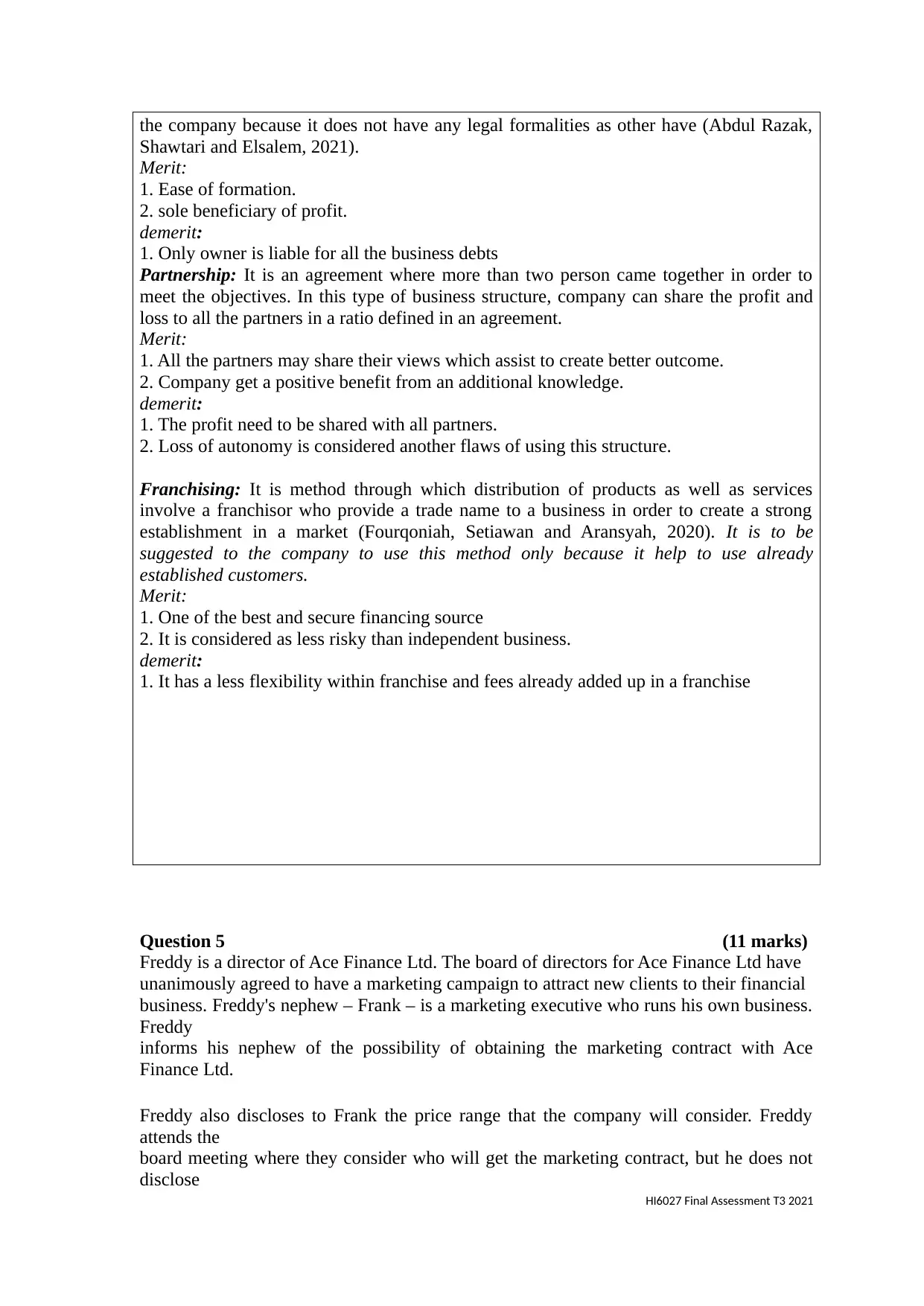
the company because it does not have any legal formalities as other have (Abdul Razak,
Shawtari and Elsalem, 2021).
Merit:
1. Ease of formation.
2. sole beneficiary of profit.
demerit:
1. Only owner is liable for all the business debts
Partnership: It is an agreement where more than two person came together in order to
meet the objectives. In this type of business structure, company can share the profit and
loss to all the partners in a ratio defined in an agreement.
Merit:
1. All the partners may share their views which assist to create better outcome.
2. Company get a positive benefit from an additional knowledge.
demerit:
1. The profit need to be shared with all partners.
2. Loss of autonomy is considered another flaws of using this structure.
Franchising: It is method through which distribution of products as well as services
involve a franchisor who provide a trade name to a business in order to create a strong
establishment in a market (Fourqoniah, Setiawan and Aransyah, 2020). It is to be
suggested to the company to use this method only because it help to use already
established customers.
Merit:
1. One of the best and secure financing source
2. It is considered as less risky than independent business.
demerit:
1. It has a less flexibility within franchise and fees already added up in a franchise
Question 5 (11 marks)
Freddy is a director of Ace Finance Ltd. The board of directors for Ace Finance Ltd have
unanimously agreed to have a marketing campaign to attract new clients to their financial
business. Freddy's nephew – Frank – is a marketing executive who runs his own business.
Freddy
informs his nephew of the possibility of obtaining the marketing contract with Ace
Finance Ltd.
Freddy also discloses to Frank the price range that the company will consider. Freddy
attends the
board meeting where they consider who will get the marketing contract, but he does not
disclose
HI6027 Final Assessment T3 2021
Shawtari and Elsalem, 2021).
Merit:
1. Ease of formation.
2. sole beneficiary of profit.
demerit:
1. Only owner is liable for all the business debts
Partnership: It is an agreement where more than two person came together in order to
meet the objectives. In this type of business structure, company can share the profit and
loss to all the partners in a ratio defined in an agreement.
Merit:
1. All the partners may share their views which assist to create better outcome.
2. Company get a positive benefit from an additional knowledge.
demerit:
1. The profit need to be shared with all partners.
2. Loss of autonomy is considered another flaws of using this structure.
Franchising: It is method through which distribution of products as well as services
involve a franchisor who provide a trade name to a business in order to create a strong
establishment in a market (Fourqoniah, Setiawan and Aransyah, 2020). It is to be
suggested to the company to use this method only because it help to use already
established customers.
Merit:
1. One of the best and secure financing source
2. It is considered as less risky than independent business.
demerit:
1. It has a less flexibility within franchise and fees already added up in a franchise
Question 5 (11 marks)
Freddy is a director of Ace Finance Ltd. The board of directors for Ace Finance Ltd have
unanimously agreed to have a marketing campaign to attract new clients to their financial
business. Freddy's nephew – Frank – is a marketing executive who runs his own business.
Freddy
informs his nephew of the possibility of obtaining the marketing contract with Ace
Finance Ltd.
Freddy also discloses to Frank the price range that the company will consider. Freddy
attends the
board meeting where they consider who will get the marketing contract, but he does not
disclose
HI6027 Final Assessment T3 2021
Paraphrase This Document
Need a fresh take? Get an instant paraphrase of this document with our AI Paraphraser
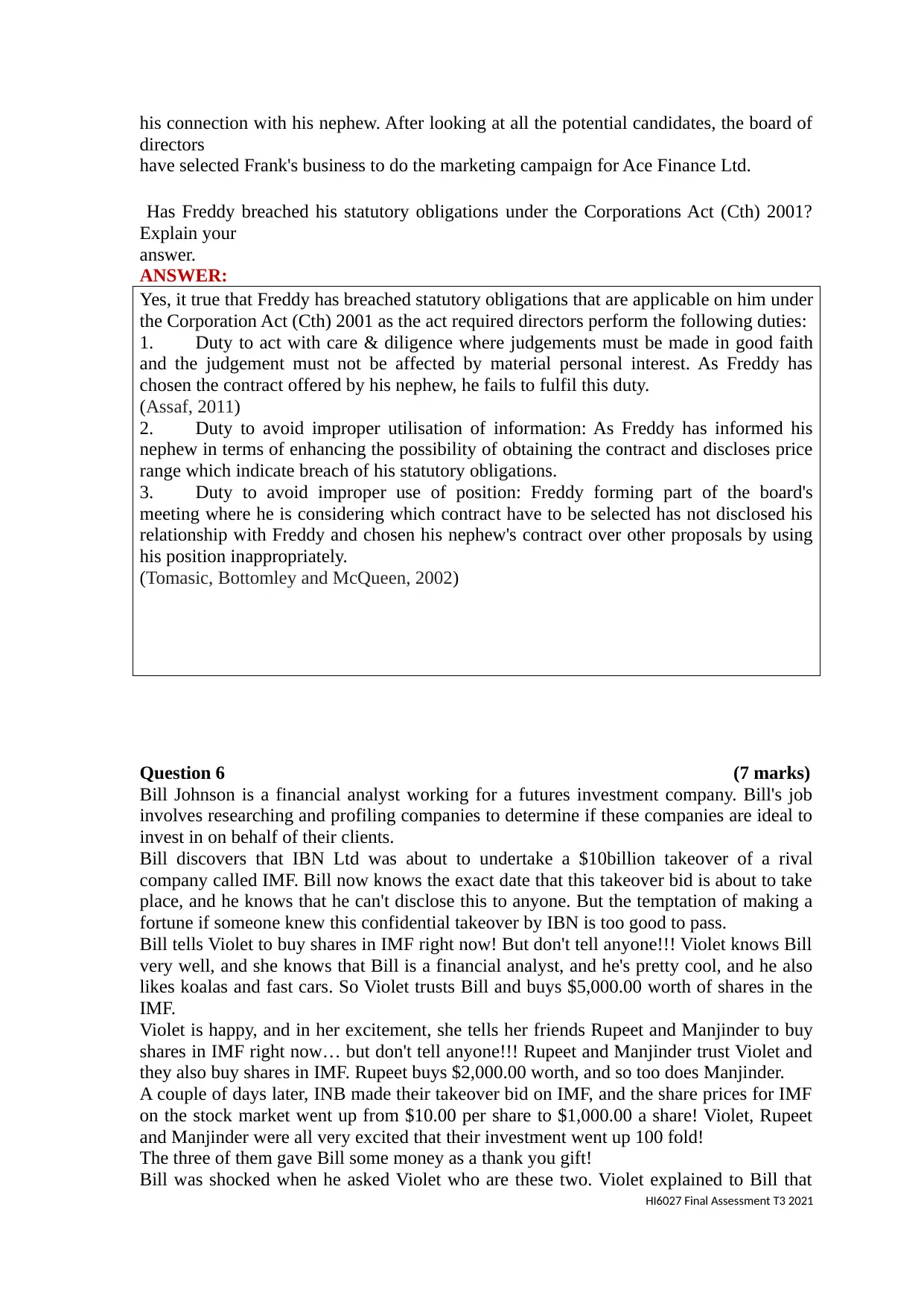
his connection with his nephew. After looking at all the potential candidates, the board of
directors
have selected Frank's business to do the marketing campaign for Ace Finance Ltd.
Has Freddy breached his statutory obligations under the Corporations Act (Cth) 2001?
Explain your
answer.
ANSWER:
Yes, it true that Freddy has breached statutory obligations that are applicable on him under
the Corporation Act (Cth) 2001 as the act required directors perform the following duties:
1. Duty to act with care & diligence where judgements must be made in good faith
and the judgement must not be affected by material personal interest. As Freddy has
chosen the contract offered by his nephew, he fails to fulfil this duty.
(Assaf, 2011)
2. Duty to avoid improper utilisation of information: As Freddy has informed his
nephew in terms of enhancing the possibility of obtaining the contract and discloses price
range which indicate breach of his statutory obligations.
3. Duty to avoid improper use of position: Freddy forming part of the board's
meeting where he is considering which contract have to be selected has not disclosed his
relationship with Freddy and chosen his nephew's contract over other proposals by using
his position inappropriately.
(Tomasic, Bottomley and McQueen, 2002)
Question 6 (7 marks)
Bill Johnson is a financial analyst working for a futures investment company. Bill's job
involves researching and profiling companies to determine if these companies are ideal to
invest in on behalf of their clients.
Bill discovers that IBN Ltd was about to undertake a $10billion takeover of a rival
company called IMF. Bill now knows the exact date that this takeover bid is about to take
place, and he knows that he can't disclose this to anyone. But the temptation of making a
fortune if someone knew this confidential takeover by IBN is too good to pass.
Bill tells Violet to buy shares in IMF right now! But don't tell anyone!!! Violet knows Bill
very well, and she knows that Bill is a financial analyst, and he's pretty cool, and he also
likes koalas and fast cars. So Violet trusts Bill and buys $5,000.00 worth of shares in the
IMF.
Violet is happy, and in her excitement, she tells her friends Rupeet and Manjinder to buy
shares in IMF right now… but don't tell anyone!!! Rupeet and Manjinder trust Violet and
they also buy shares in IMF. Rupeet buys $2,000.00 worth, and so too does Manjinder.
A couple of days later, INB made their takeover bid on IMF, and the share prices for IMF
on the stock market went up from $10.00 per share to $1,000.00 a share! Violet, Rupeet
and Manjinder were all very excited that their investment went up 100 fold!
The three of them gave Bill some money as a thank you gift!
Bill was shocked when he asked Violet who are these two. Violet explained to Bill that
HI6027 Final Assessment T3 2021
directors
have selected Frank's business to do the marketing campaign for Ace Finance Ltd.
Has Freddy breached his statutory obligations under the Corporations Act (Cth) 2001?
Explain your
answer.
ANSWER:
Yes, it true that Freddy has breached statutory obligations that are applicable on him under
the Corporation Act (Cth) 2001 as the act required directors perform the following duties:
1. Duty to act with care & diligence where judgements must be made in good faith
and the judgement must not be affected by material personal interest. As Freddy has
chosen the contract offered by his nephew, he fails to fulfil this duty.
(Assaf, 2011)
2. Duty to avoid improper utilisation of information: As Freddy has informed his
nephew in terms of enhancing the possibility of obtaining the contract and discloses price
range which indicate breach of his statutory obligations.
3. Duty to avoid improper use of position: Freddy forming part of the board's
meeting where he is considering which contract have to be selected has not disclosed his
relationship with Freddy and chosen his nephew's contract over other proposals by using
his position inappropriately.
(Tomasic, Bottomley and McQueen, 2002)
Question 6 (7 marks)
Bill Johnson is a financial analyst working for a futures investment company. Bill's job
involves researching and profiling companies to determine if these companies are ideal to
invest in on behalf of their clients.
Bill discovers that IBN Ltd was about to undertake a $10billion takeover of a rival
company called IMF. Bill now knows the exact date that this takeover bid is about to take
place, and he knows that he can't disclose this to anyone. But the temptation of making a
fortune if someone knew this confidential takeover by IBN is too good to pass.
Bill tells Violet to buy shares in IMF right now! But don't tell anyone!!! Violet knows Bill
very well, and she knows that Bill is a financial analyst, and he's pretty cool, and he also
likes koalas and fast cars. So Violet trusts Bill and buys $5,000.00 worth of shares in the
IMF.
Violet is happy, and in her excitement, she tells her friends Rupeet and Manjinder to buy
shares in IMF right now… but don't tell anyone!!! Rupeet and Manjinder trust Violet and
they also buy shares in IMF. Rupeet buys $2,000.00 worth, and so too does Manjinder.
A couple of days later, INB made their takeover bid on IMF, and the share prices for IMF
on the stock market went up from $10.00 per share to $1,000.00 a share! Violet, Rupeet
and Manjinder were all very excited that their investment went up 100 fold!
The three of them gave Bill some money as a thank you gift!
Bill was shocked when he asked Violet who are these two. Violet explained to Bill that
HI6027 Final Assessment T3 2021
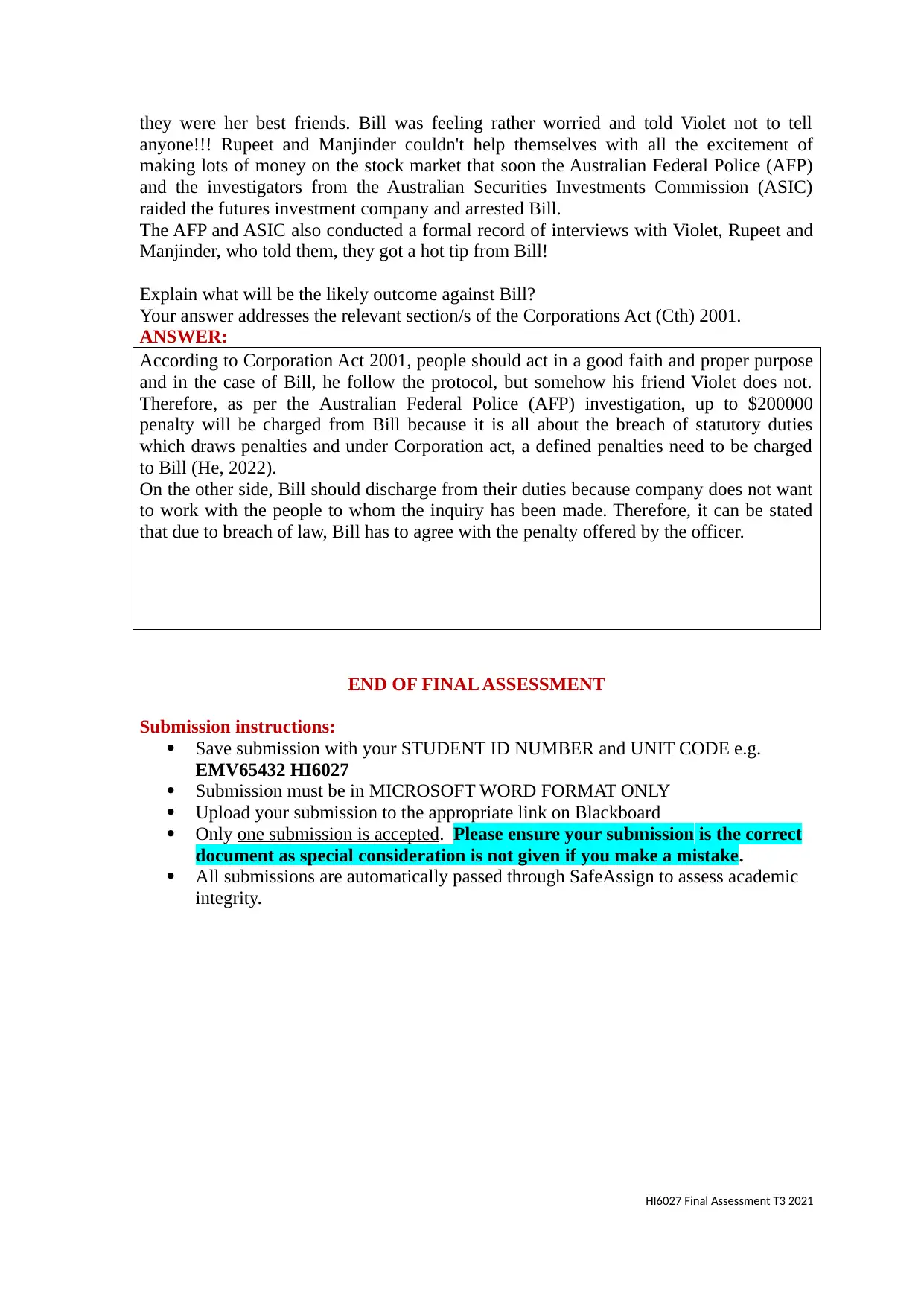
they were her best friends. Bill was feeling rather worried and told Violet not to tell
anyone!!! Rupeet and Manjinder couldn't help themselves with all the excitement of
making lots of money on the stock market that soon the Australian Federal Police (AFP)
and the investigators from the Australian Securities Investments Commission (ASIC)
raided the futures investment company and arrested Bill.
The AFP and ASIC also conducted a formal record of interviews with Violet, Rupeet and
Manjinder, who told them, they got a hot tip from Bill!
Explain what will be the likely outcome against Bill?
Your answer addresses the relevant section/s of the Corporations Act (Cth) 2001.
ANSWER:
According to Corporation Act 2001, people should act in a good faith and proper purpose
and in the case of Bill, he follow the protocol, but somehow his friend Violet does not.
Therefore, as per the Australian Federal Police (AFP) investigation, up to $200000
penalty will be charged from Bill because it is all about the breach of statutory duties
which draws penalties and under Corporation act, a defined penalties need to be charged
to Bill (He, 2022).
On the other side, Bill should discharge from their duties because company does not want
to work with the people to whom the inquiry has been made. Therefore, it can be stated
that due to breach of law, Bill has to agree with the penalty offered by the officer.
END OF FINAL ASSESSMENT
Submission instructions:
Save submission with your STUDENT ID NUMBER and UNIT CODE e.g.
EMV65432 HI6027
Submission must be in MICROSOFT WORD FORMAT ONLY
Upload your submission to the appropriate link on Blackboard
Only one submission is accepted. Please ensure your submission is the correct
document as special consideration is not given if you make a mistake.
All submissions are automatically passed through SafeAssign to assess academic
integrity.
HI6027 Final Assessment T3 2021
anyone!!! Rupeet and Manjinder couldn't help themselves with all the excitement of
making lots of money on the stock market that soon the Australian Federal Police (AFP)
and the investigators from the Australian Securities Investments Commission (ASIC)
raided the futures investment company and arrested Bill.
The AFP and ASIC also conducted a formal record of interviews with Violet, Rupeet and
Manjinder, who told them, they got a hot tip from Bill!
Explain what will be the likely outcome against Bill?
Your answer addresses the relevant section/s of the Corporations Act (Cth) 2001.
ANSWER:
According to Corporation Act 2001, people should act in a good faith and proper purpose
and in the case of Bill, he follow the protocol, but somehow his friend Violet does not.
Therefore, as per the Australian Federal Police (AFP) investigation, up to $200000
penalty will be charged from Bill because it is all about the breach of statutory duties
which draws penalties and under Corporation act, a defined penalties need to be charged
to Bill (He, 2022).
On the other side, Bill should discharge from their duties because company does not want
to work with the people to whom the inquiry has been made. Therefore, it can be stated
that due to breach of law, Bill has to agree with the penalty offered by the officer.
END OF FINAL ASSESSMENT
Submission instructions:
Save submission with your STUDENT ID NUMBER and UNIT CODE e.g.
EMV65432 HI6027
Submission must be in MICROSOFT WORD FORMAT ONLY
Upload your submission to the appropriate link on Blackboard
Only one submission is accepted. Please ensure your submission is the correct
document as special consideration is not given if you make a mistake.
All submissions are automatically passed through SafeAssign to assess academic
integrity.
HI6027 Final Assessment T3 2021
⊘ This is a preview!⊘
Do you want full access?
Subscribe today to unlock all pages.

Trusted by 1+ million students worldwide
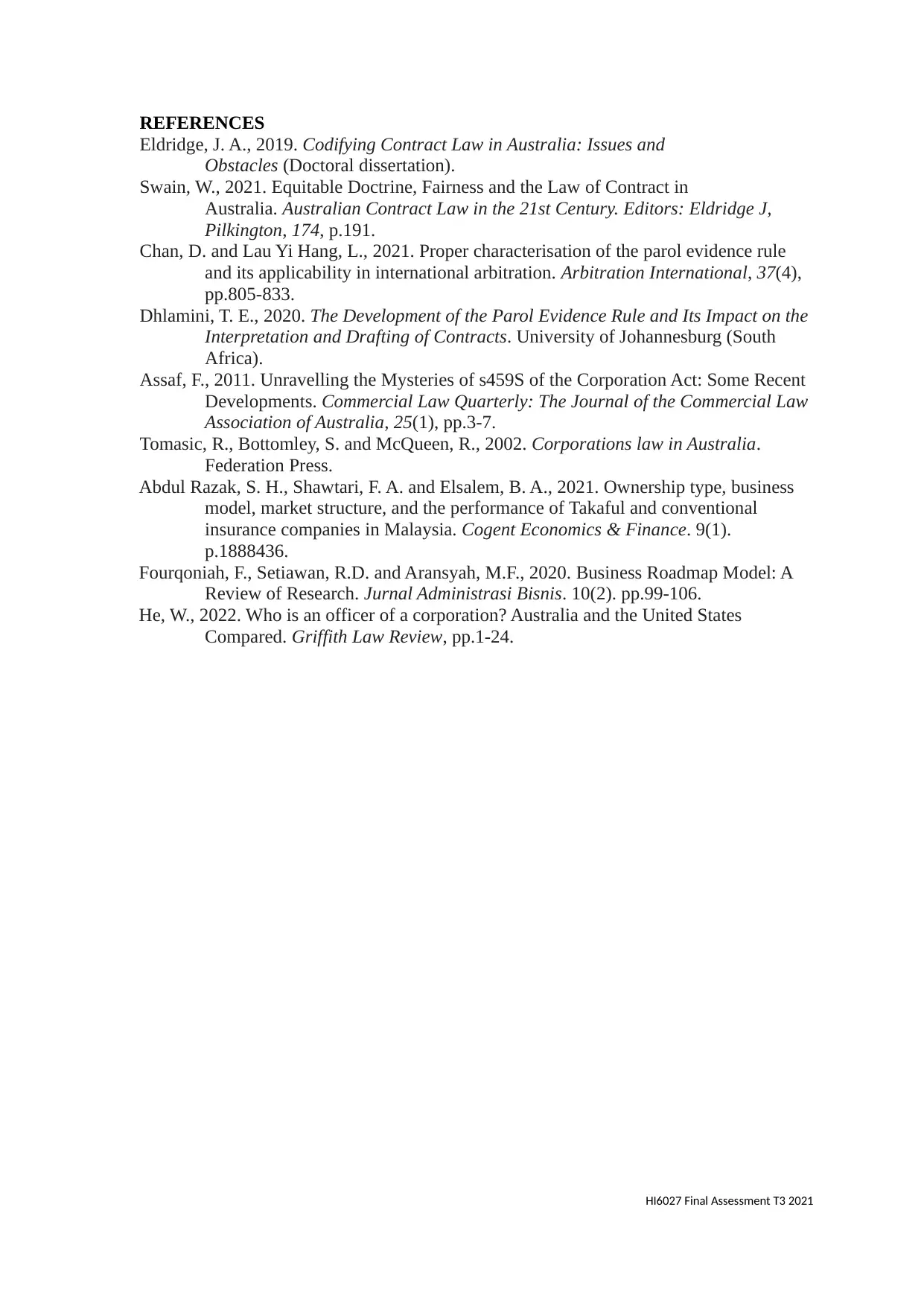
REFERENCES
Eldridge, J. A., 2019. Codifying Contract Law in Australia: Issues and
Obstacles (Doctoral dissertation).
Swain, W., 2021. Equitable Doctrine, Fairness and the Law of Contract in
Australia. Australian Contract Law in the 21st Century. Editors: Eldridge J,
Pilkington, 174, p.191.
Chan, D. and Lau Yi Hang, L., 2021. Proper characterisation of the parol evidence rule
and its applicability in international arbitration. Arbitration International, 37(4),
pp.805-833.
Dhlamini, T. E., 2020. The Development of the Parol Evidence Rule and Its Impact on the
Interpretation and Drafting of Contracts. University of Johannesburg (South
Africa).
Assaf, F., 2011. Unravelling the Mysteries of s459S of the Corporation Act: Some Recent
Developments. Commercial Law Quarterly: The Journal of the Commercial Law
Association of Australia, 25(1), pp.3-7.
Tomasic, R., Bottomley, S. and McQueen, R., 2002. Corporations law in Australia.
Federation Press.
Abdul Razak, S. H., Shawtari, F. A. and Elsalem, B. A., 2021. Ownership type, business
model, market structure, and the performance of Takaful and conventional
insurance companies in Malaysia. Cogent Economics & Finance. 9(1).
p.1888436.
Fourqoniah, F., Setiawan, R.D. and Aransyah, M.F., 2020. Business Roadmap Model: A
Review of Research. Jurnal Administrasi Bisnis. 10(2). pp.99-106.
He, W., 2022. Who is an officer of a corporation? Australia and the United States
Compared. Griffith Law Review, pp.1-24.
HI6027 Final Assessment T3 2021
Eldridge, J. A., 2019. Codifying Contract Law in Australia: Issues and
Obstacles (Doctoral dissertation).
Swain, W., 2021. Equitable Doctrine, Fairness and the Law of Contract in
Australia. Australian Contract Law in the 21st Century. Editors: Eldridge J,
Pilkington, 174, p.191.
Chan, D. and Lau Yi Hang, L., 2021. Proper characterisation of the parol evidence rule
and its applicability in international arbitration. Arbitration International, 37(4),
pp.805-833.
Dhlamini, T. E., 2020. The Development of the Parol Evidence Rule and Its Impact on the
Interpretation and Drafting of Contracts. University of Johannesburg (South
Africa).
Assaf, F., 2011. Unravelling the Mysteries of s459S of the Corporation Act: Some Recent
Developments. Commercial Law Quarterly: The Journal of the Commercial Law
Association of Australia, 25(1), pp.3-7.
Tomasic, R., Bottomley, S. and McQueen, R., 2002. Corporations law in Australia.
Federation Press.
Abdul Razak, S. H., Shawtari, F. A. and Elsalem, B. A., 2021. Ownership type, business
model, market structure, and the performance of Takaful and conventional
insurance companies in Malaysia. Cogent Economics & Finance. 9(1).
p.1888436.
Fourqoniah, F., Setiawan, R.D. and Aransyah, M.F., 2020. Business Roadmap Model: A
Review of Research. Jurnal Administrasi Bisnis. 10(2). pp.99-106.
He, W., 2022. Who is an officer of a corporation? Australia and the United States
Compared. Griffith Law Review, pp.1-24.
HI6027 Final Assessment T3 2021
1 out of 7
Related Documents
Your All-in-One AI-Powered Toolkit for Academic Success.
+13062052269
info@desklib.com
Available 24*7 on WhatsApp / Email
![[object Object]](/_next/static/media/star-bottom.7253800d.svg)
Unlock your academic potential
Copyright © 2020–2025 A2Z Services. All Rights Reserved. Developed and managed by ZUCOL.




